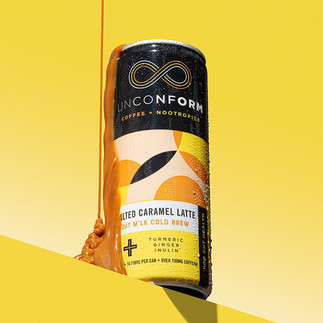Refreshment focuses on the water dispenser/cooler, office coffee service and vending sectors, while also taking an in-depth look into products for vending from bottled water and drinks, to snacks and confectionery. It also focuses on hydration, health and wellness, new technologies and environmental and social responsibility issues.
Research
Coffee & tea


From functional ingredients to cold brew culture, coffee is undergoing one of its biggest transformations in decades. Once defined by café culture and social connection, the category is now driven by innovation, premiumisation and health-forward trends. Yusuf Amanullah, founder of Unconform, – winner of FoodBev’s World Coffee Innovation Awards 2025 – explores how shifting consumer expectations are reshaping how, when and why people drink coffee today.
The coffee market has undergone a seismic shift. Once viewed as a social lubricant in cafés and 'third spaces,' coffee is now driven by innovation, flavour and functionality. Consumers want more – more formats, more variety and more purpose in their cup.
This comes from a few key areas when looking at the data. Convenience has been a major growth driver. Ready-to-drink (RTD) coffee continues to outperform the wider drinks market (NIQ), mirroring a broader shift seen across categories from cocktails to matcha.
At the same time, premiumisation is redefining expectations. People are settling less for average coffee.
It started with single-origin beans, championing heritage, culture, story and innovation. While this still has a place, it has now become less of a selling point, but instead a standard.
Customers are now looking at premium preparations instead. That is why cold brew has become so much more popular. It is important to note that cold brew and iced coffee are not necessarily the same – cold brew is the process of steeping coarse-ground coffee beans in cold water for 15-24 hours. This extracts the flavour and caffeine from the beans, without the acidity and bitterness. Iced coffee, while it covers cold brew as a subset, is generally a hot espresso shot over ice.
So much is the demand for premiumisation, that 90% of consumers are willing to pay the premium for coffee experiences, and there has been a 300% increase in demand for cold brew. It’s given rise to the likes of Blank Street Coffee, who have travelled across the pond from the US and have succeeded quite spectacularly, particularly in London.
What perhaps still needs work on, however, is the education piece around cold brew. While it is a popular go-to in America, cold brew is still synonymous with ‘iced coffee’ (much to my ongoing frustration).
Perhaps it is because it is still a foreign concept to many in the UK, but personally I think it says more about the maturity of the coffee market in the country. Go to the US, and cold brew is a regular drink consumed by many.
Australia has one of the most sophisticated coffee markets in the world, as they pride themselves to be ‘coffee purists’. If you go to the likes of Saudi Arabia or the UAE, you have a wide selection of coffee preparations on tap at any store, from cold brew to drip to V60 and others. The UK still has a long way to go, but it clearly is waking up to the fact that there is more out there to consider.
Functionality and health take centre stage
The third area is the focus on functional health. While still in its infancy in the coffee space, functionality in drinks is the area of focus. It comes from a general wave of focus around what people put in their bodies.
For example, Mintel data shows 83% of people now search for low- or no-sugar alternatives, while Ocado has reported a 54% year-on-year rise in 'health drink; sales. More than half of consumers (56%, Attest) seek energy and focus through sustainable, healthier options. Growth in the likes of Tenzing, as well as new entrants like Celsius, show that people are after more sophistication in their energy drinks too, so it is no surprise this is moving into the coffee category.
This shift has opened the door to functional ingredients, or 'nootropics,' such as Ashwagandha, Lion’s Mane and L-Theanine. Retailers and cafés are taking notice – M&S launched a mushroom latte in partnership with Kew Gardens earlier this year, while Black Sheep Coffee now offers functional add-ons across its menu.
It’s clear that coffee’s role is evolving far beyond the morning pick-me-up. As consumers demand more from every cup, brands that combine education, innovation and wellbeing will define the next chapter of coffee culture.
There is still a long way to go, and the onus is on brands to educate the consumer on what their coffee can do for them. And while the classics do and always will have a place, people are willing to try new and different ways to have their coffee, be that preparation, contents or occasion. It’s an exciting time for the space, and there is no doubt that there is more ground to be covered.
.png)

%20(1).jpg)











